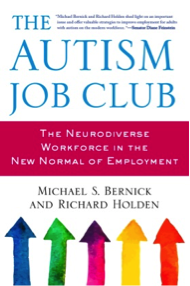 This week The Autism Job Club is being published (book’s website). Richard Holden, Bureau of Labor Statistics (BLS) Regional Commissioner and I are the authors. Much of the book focuses on employment initiatives in California, especially a job club for adults with autism that we have been involved with in the Bay Area.
This week The Autism Job Club is being published (book’s website). Richard Holden, Bureau of Labor Statistics (BLS) Regional Commissioner and I are the authors. Much of the book focuses on employment initiatives in California, especially a job club for adults with autism that we have been involved with in the Bay Area.
When I started in California’s autism community 24 years ago, autism was a little-known and little-discussed condition. Today, it is impossible to pick up a newspaper or book, or turn on the television, or go to the movies without an autism reference.
However, despite the heightened autism presence in public consciousness, the employment situation of adults with autism in California and nationwide has changed little. In the early 1990s, the unemployment rate among adults with autism was estimated at over 65%. Today, the unemployment estimates are as high or higher.
In the book we discuss the dynamics of this high unemployment rate. Chief among these dynamics are the heightened competition for all jobs and changing structure of employment, the sharp rise in government disability rolls, and the failure of several highly touted government initiatives, particularly the Ticket-to-Work, to have any significant impacts.
The book focuses on collective and individual efforts to increase employment of adults with autism. These are the efforts to place adults with autism in tech positions—including Ultra Testing, SAP, and Specialists Guild. They are the small businesses targeting adults with autism, such as the Rising Tide Car Wash, Roses for Autism, and the Agricultural Communities for Adults with Autism; and they are the larger businesses, such as Walgreens and Best Buy with autism initiatives. Most of all they are the art of the autism job coach, the understanding of the job placement techniques applicable to all workers and how these are tailored and taken up by adults with autism.
The book has the subtitle: “The Neurodiverse Workforce in the New Normal of Employment”. That’s because autism is a proxy for other neurodiverse populations—adults with cerebral palsy, dyslexia, learning disabilities. The same employment strategies applicable to adults with autism are applicable to these groups.
The FRED conference in Los Angeles for “special needs adults” is one of the main annual conferences involving the autism community. In 2014, the panel on employment was the featured panel; and the conference lead, Ms. Mari-Anne Kehler, opened by stating, “Nothing says purpose and living with meaning like employment.” Then followed several references by the panel moderator, an attorney in the San Gabriel Valley, to the “incredible” skills of our young adults with disabilities, and the “amazing” employment projects they were involved in, that were paving the way to fuller employment.
In fact, the employment opportunities that the participants described were very modest: a job at a small restaurant in Albuquerque; a micro-business in animation started by a college student with autism in Southern California; a series of small ventures in laundry service, premium candles, and office services by a non-profit autism agency in Chapel Hill. Looked at one way, the number of jobs generated was miniscule, the claims of fuller employment wildly exaggerated.
Yet, look at another way, something unusual and noteworthy was going on in the conference. The presenters and audience were not whining or complaining or presenting themselves as victims. Nor were they waiting for government to do something. Against all odds, they were trying to generate employment for themselves and others, to engage in mutual support, to work with government but also outside of government.
The autism community’s efforts toward a better employment are still in their early stages. We are in a wilderness that we only partly understand, and on a road that is not clearly marked. We have much to discover. Perhaps most of all, the book is a call for other Californians to join our collective effort.

